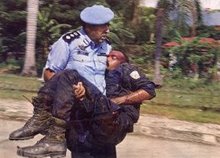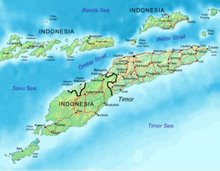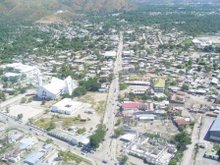 Lindsay Murdoch in Darwin October 31, 2008
Lindsay Murdoch in Darwin October 31, 2008EAST TIMOR'S President, Jose Ramos-Horta, has found the man who shot and almost killed him, instantly recognising him during a visit to Dili's Becora jail.
"I stared at him. He turned away, embarrassed and couldn't look me in the eye," Mr Ramos-Horta told the Herald yesterday. "I have been waiting for him to come forward and confess his crimes."
Mr Ramos-Horta said the man he identified as having shot him twice in the back in Dili on February 11 was not Marcelo Caetano, the rebel named as his attacker who was hunted in East Timor's mountains by hundreds of soldiers, including Australia's SAS commandos. "Marcelo Caetano was wrongly accused," Mr Ramos-Horta said. "I never said it was him. It was a media beat-up."
Mr Ramos-Horta realised the mistake in April, when Caetano, a member of the gang of the renegade soldier Alfredo Reinado, surrendered with other rebels. Rather than "deep anger" showing on the face of the President when he met Caetano, as one Australian newspaper reported, Mr Ramos-Horta said he was upset that a dreadful mistake had been made.
Mr Ramos-Horta said the man who shot him was one of Reinado's gang, among a group of 22 rebels held in Becora jail until East Timor's prosecutor-general completes an investigation into the attacks. "Those rumours and innuendo that it was an element of [East Timor's army] or somebody else who shot me are absolutely wrong," he said.
Mr Ramos-Horta, who survived the attack after emergency surgery in Darwin, said he had not asked the name of the man he identified as his attacker.
"I await the legal process," he said. "If or when the prosecutor wants me to come face to face with the man in an identification parade, I will do it."
Mr Ramos-Horta said he saw the man from less than 20 metres. "I looked at the intent in his eyes and at that precise moment I turned to run and he shot me twice in the back."
He was not worried the investigation into the attacks was not complete. East Timorese knew the basic facts about what happened and prosecutions would begin in February.
"What they know is that the President was shot by elements of Alfredo Reinado on February 11," Mr Ramos-Horta said. Reinado and one of his men were shot dead at Mr Ramos-Horta's house.
Mr Ramos-Horta was visiting Darwin yesterday, where, in an address to the Parliament, he urged the Northern Territory to develop close ties with East Timor.







3 comentários:
O jornal e jornalista que publicou a difamacao do homem devem pagar indiminizacao ao homem.
Ainda bem que nao mataram o homem e seus familiares.
Se o Presidente tivesse morrido o homem ficava acusado para sempre de ter matado o Presidente.
E o dever do Presidente de obrigar o jornalista que escreveu tal mentira de pedir desculpa em publico ao homeme eao Presidente tambem. Usaram falsamente o nome do Presidente e mentiram aos timorenses e a comunidade internacional sobre o acusado e declaracoes do Presidente Horta.
TIMOR-LESTE: Settling age-old land disputes
31 Oct 2008 13:40:06 GMT
Source: IRIN
Reuters and AlertNet are not responsible for the content of this article or for any external internet sites. The views expressed are the author's alone.
DILI, 31 October 2008 (IRIN) - Timor-Leste is addressing ancient land disputes created by centuries of occupation and confusion over land titles.
For 450 years, East Timor was a Portuguese colony and for 25 years thereafter occupied by Indonesia. At independence in 2002, the country was left with overlapping claims of land ownership and property deeds. Most land in Dili during the Indonesian occupation belonged to the state.
"The history of land ownership in Timor is extremely complicated," Nigel Thompson, of the USAID-funded "Ita nia rai" (our land) project, told IRIN. As part of the US$10 million project, a database will be developed, with citizens registering their land claims.
"Securing land title for farmers in rural areas will help protect them from potential exploitation as global demand for crops such as rice increases and bio fuels become more popular," Breanna Risdel, public information and awareness team leader for the project, told IRIN.
However, resolving conflicting claims will depend heavily on final approval of a land and property law that is due to go before parliament by year-end.
Rural vs urban disputes
Risdel said most disputes in rural areas took place over inheritance of land but claims were often resolved through traditional dispute-resolution methods.
However, disputes in urban areas have been exacerbated by multiple land title claims and repeated displacement of families over the years.
Many residents - both Indonesian and East Timorese - fled the capital during the violence around the Indonesian withdrawal in 1999, and many more were displaced during conflict in 2006.
People returning to the city after the violence subsided occupied intact and destroyed houses, often rebuilding or repairing them with their own money.
Possession a priority
The key objective of the Ita nia rai project is to develop a land law that will prove satisfactory for those occupying land as well as those who claim an official title.
There are many wealthy families who lay claim to large tracts of prime land, mainly in Dili. People without titles, who may have a legitimate claim to such land, currently occupy much of it.
Funding the dispute-resolution process from government coffers and possibly establishing a separate tribunal to deal with land rights, is the only way to ensure all claimants get fair consideration, Ibere Lopez, policy and legislation specialist for the project, told IRIN.
"If you don't do that the only way to enforce land rights is through the courts," he said, adding that poor people would struggle to defend their land claim as the court processes are expensive.
Very few land disputes are resolved by the courts. "The courts are busy with the criminal cases and they don't know how to deal with these [land] issues," Lopez said.
Women's rights
Women head 19 percent of households in Timor-Leste, and are being encouraged to make land claims.
Both patrilineal and matrilineal systems exist in customary law, but there are social barriers to formally recognising women as property owners.
"In the public information and awareness [part of the project], we stress constitutional issues of equality [and in the] focus groups involve women, because traditionally they tend to miss out on this information," Thompson told IRIN.
Solution not perfect
Considering the confusing title systems of the past, the recognition of possession before title is probably the fairest solution, Lopez told IRIN.
One of the options in the draft law before the Minister of Justice entails the government paying compensation to those who claim to have a title, and awarding a new title to the possessor of the property.
However, even under this system some people will lose out, he said.
"There is no way any process, any criteria [or] any land law would please everyone."
Enviar um comentário